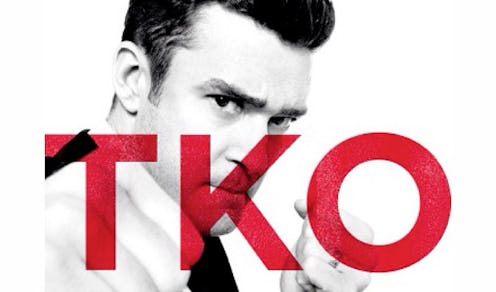Entertainment
Is "TKO" Glorifying Domestic Abuse?

Justin TImberlake's newest music video for his song "TKO" is... strange, to say the least. Quick recap: JT is lovin' up on this super hot (and super evil) girl played by Elvis Presley's granddaughter, Riley Keough, who only wears men's shirts and nothing else. She refuses his affections, ties him to the back of a pick-up truck, and drags him through the moonlit desert after hitting him over the head with a cast-iron skillet. Also, she has great hair.
It's easy to make light of the "TKO" video because, when he's not playing a heartbroken, cruelly unrequited lover with slicked back hair in blue-toned music videos, Justin Timberlake is hilarious. He's already joined the Five Timers club of hosts on Saturday Night Live, and he's BFFs with Jimmy Fallon, with whom he makes amazing videos.
But even though JT is a big goofball, it doesn't absolve him of the problems associated with depicting domestic abuse in his new music video. Yes, it's done "artfully," but that doesn't excuse it — we are supposed to feel sympathetic for Timberlake in the video, when he's being dragged along by the ankles through the sand. And we do. But videos like "TKO" could be a trigger for victims, making them a very dangerous art form.
"TKO" isn't the only video to feature domestic violence as a backdrop to a top-selling hit. The most famous and controversial video depicting domestic violence is, of course, Eminem's 2010 song "Love the Way You Lie," featuring Rihanna, which they released not too long after Chris Brown was arrested for his violent attack on his then-girlfriend. The video stars Megan Fox and hobbit Dominic Monaghan in a mutually abusive relationship and ends in them perishing as their home goes up in flames — a visual proxy for Eminem's long, abusive relationship with his ex-wife Kim Mathers. But what is truly disturbing about the song, the video, and Rihanna's participation is both of the artists' proximity to violence — some felt Rihanna, as a victim, was glorifying the cycle of abuse. After the song was released, Rihanna said of her collaboration:
"It's something that, you know, [Eminem and I have] both experienced, you know, on different sides, different ends of the table," she said.
"It just was authentic. It was real," Rihanna continued. "It was believable for us to do a record like that, but it was also something that needed to be done and the way he did it was so clever. He pretty much just broke down the cycle of domestic violence and it's something that a lot people don't have a lot of insight on, so this song is a really, really powerful song and it touches a lot of people."
What's worrisome here is Rihanna's suggestion that Eminem "broke down the cycle of violence," because it seems to absolve him for 20 years of a very public, very abusive relationship with Kim, which he chronicled with disturbing and violent lyrics throughout his career. Just because the artists involved do not have the intention of glorifying abuse doesn't mean that's not the message they will send.
Both "Love the Way You Lie" and "TKO" could be triggers for victims of violence — to see their horrifying personal experiences in popular music videos could be especially disturbing. Do we condemn Justin Timberlake for "TKO"? No, not necessarily — but why not? Because he is not actually abusive? Rihanna said that her video with Eminem was cathartic, but what about for the viewers?
If these videos open up a conversation about domestic violence, that is a slim silver lining. But artists shouldn't turn to real, dangerous cycles of abuse as inspiration for their pop videos. Looking at you, Timberlake.